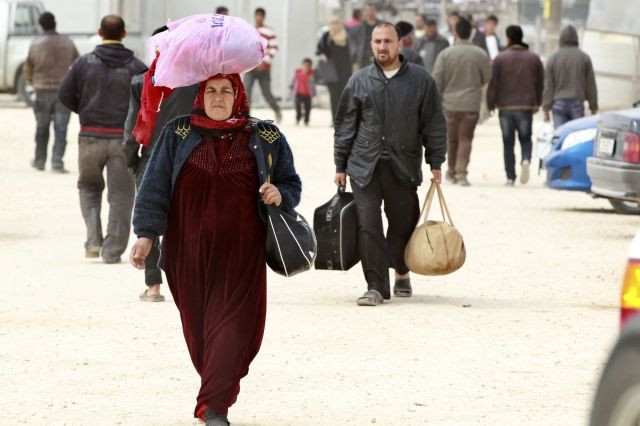Syrian Refugee Figure Reaches One Million; Huge Influx Puts Neighboring Nations Under Strain

The number of Syrian refugees who have fled their country after two years of civil conflict has reached the one million mark, UNHCR, the U.N.'s refugee agency, announced on Wednesday.
More than 400,000 people have left the country since Jan. 1.
About half of the refugees are children, the majority of whom are under 11, the U.N. said. The majority of the refugees have fled to Lebanon, Jordan, Turkey, Iraq and Egypt. Syrians are also fleeing to North Africa and Europe in increasing numbers, according to the U.N.'s data.
U.N. High Commissioner for Refugees António Guterres said that refugees arriving in neighboring countries have had a “severe” impact on their host countries.
Lebanon's population has increased by as much as 10 percent, while Jordan's energy, water, health and education services are strained to the limit, the UNHCR said in a statement. Turkey has spent more than $600 million setting up 17 refugee camps, with more under construction. Iraq, which is dealing with its own crisis -- which internally displaced more than one million Iraqis -- has been home to more than 100,000 Syrian refugees in the past year.
"With a million people in flight, millions more displaced internally, and thousands of people continuing to cross the border every day, Syria is spiraling towards full-scale disaster,” Guterres said in the statement. "We are doing everything we can to help, but the international humanitarian response capacity is dangerously stretched. This tragedy has to be stopped."
He said that refugee host countries “should not only be recognized for their unstinting commitment to keeping their borders open for Syrian refugees, they should be massively supported as well.”
“We are constantly shocked by the horrific stories Syrian refugees tell us. Their lives are in turmoil. They have lost their homes and family members. By the time they reach the borders, they are exhausted, traumatized and with little or no resources to rely on,” Panos Moumtzis, UNHCR Humanitarian Coordinator for the Syria Emergency, said in a statement appealing for donations.
The British government’s international development secretary, Justine Greening, urged international donors on Wednesday to deliver the humanitarian help they had promised earlier.
In a massive funding drive in Kuwait in January, international donors had committed more than $1.5 billion for the humanitarian crisis in Syria. The bulk of that money was pledged by Gulf countries, and Kuwait, Saudi Arabia and Qatar promised $300 million each. But the U.N. said funding was not being delivered quickly enough.
“One million refugees is a terrible [milestone], and the most vulnerable groups are inevitably those who find themselves at greatest risk. Syria’s neighbors cannot deal with this alone, and all donors must rapidly deliver on the promises they made in Kuwait,” Greening said in a statement.
The statement noted that at least four million more people are in desperate need of humanitarian assistance inside Syria.
“We are working closely with agencies on the ground. Britain has never stood on the sidelines, and we are determined to make sure our support gets help to those in need as quickly and effectively as possible,” she said.
On Tuesday, Jordan's King Abdullah called on nations to help his country, Turkey and Lebanon to bear “the tremendous burden” of caring for the huge influx of people, the BBC reported.
A U.N. report released on Tuesday said that thousands of schools have been damaged or converted into shelters for civilians displaced by civil war, and that the attendance rates of both teachers and students have plummeted since the start of the civil war.
The assessment, which was made by UNICEF, or the United Nations Children’s Fund, said that one-fifth of the country’s schools have suffered direct physical damage or are being used to shelter internally displaced persons (IDPs), with the cities of Idlib, Aleppo and Deraa being the worst hit.
UNICEF found, based on data collected in December, that more than 110 teachers and other staff have been killed in Syria since the conflict began, and many others are no longer reporting for work.
“The education system in Syria is reeling from the impact of violence,” UNICEF’s Syria Representative, Youssouf Abdel-Jelil, said in a statement. “Syria once prided itself on the quality of its schools. Now it’s seeing the gains it made over the years rapidly reversed.”
The U.N. agency is currently supporting more than 170 school clubs, which allow some 40,000 children to receive remedial education and take part in recreational activities in Homs, Deraa, rural Damascus, Tartous, Lattakia, Hama and Quneitra.
© Copyright IBTimes 2024. All rights reserved.





















